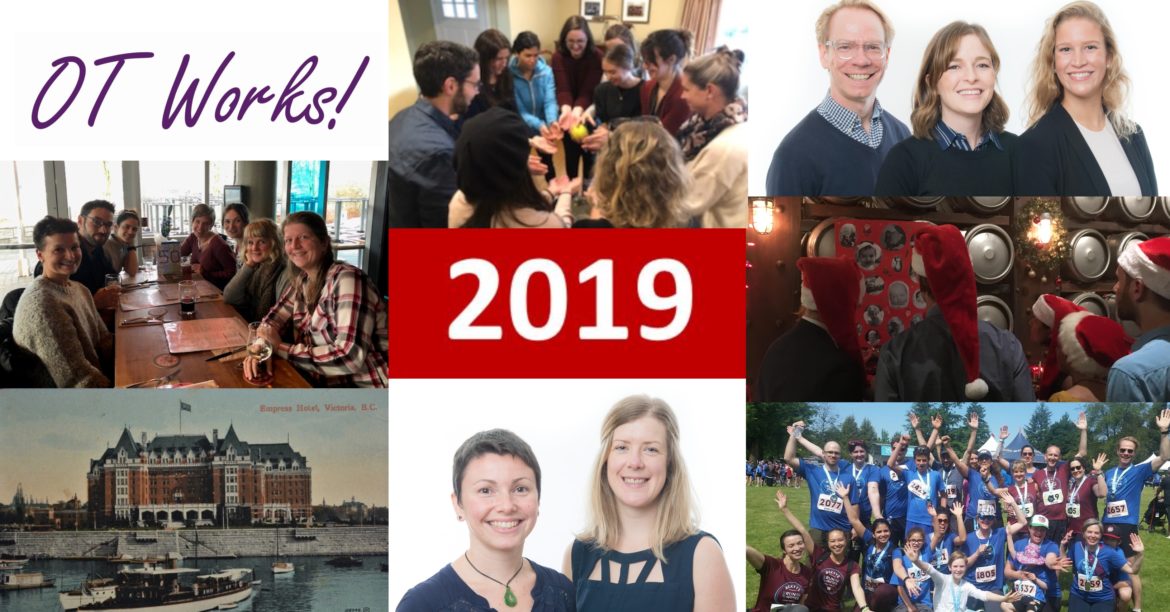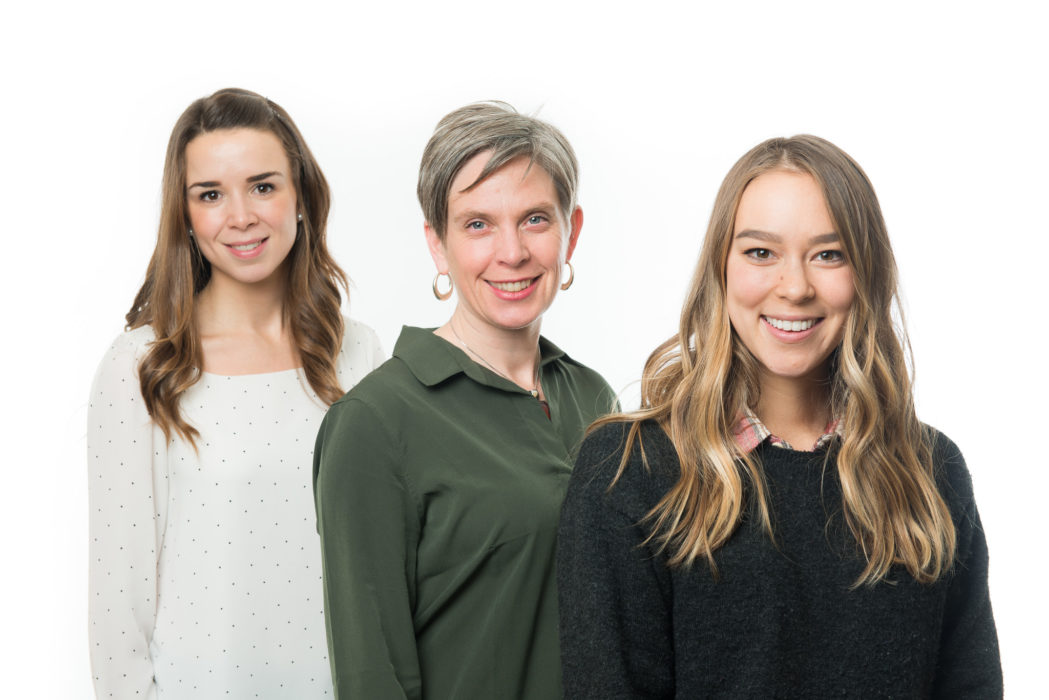12 Science-Based Benefits of Meditation
Occupational therapy promotes increased independence while carrying out tasks and activities. Meditation is one way clients can train their minds to focus on what they can and will do.
Check out Healthline’s article here.
2019 – OT Works! Year in Review
Helping Others, Growing, Learning, and Having Fun
As 2019 draws to a close, we reflect on how we have grown as a team and as a part of our wider community this past year. In 2019, OT Works! continued to grow, develop and have fun. We have been privileged to work with amazing people, customers and clients. We love occupational therapy and share our knowledge and skills with others.
- Growing Team and Families: We welcomed four occupational therapists to our team. Welcome Bronwyn, Mathilde, Jodie and Megan! Several of our OTs also welcomed new babies and we celebrate growing, healthy families!
- Vancouver Island: OT Works has expanded to serve Vancouver Island. We now serve Greater Victoria area (Victoria, Esquimalt, Oak Bay, Sooke, Saanich, Sidney, Langford, Colwood, Metchosin) and the Central Vancouver Island (Campbell River, Courtenay, Comox, Cumberland, Fanny Bay, Nanoose Bay, Union Bay).
- Sharing and Learning: We continue to grow and learn from each other through monthly clinical in-services, regular mentor-ship and and informal clinical discussions. Continuous learning, feedback, and collaboration fosters better results and better care.
- Giving Back: As part of our commitment to the health communities and healthy people, we participated and supported the 2019 Run for Water. We are thrilled to have fund-raised and contributed over $2,226 to clean drinking water in Bekyye, Ethiopia. We also supported World Wildlife Fund and Because I am a Girl,
- Having Fun: Getting together and sharing stories and laughter is a big part of what makes being part of the OT Works! team enjoyable. By getting together for regular socials events and sharing stories over coffee, we celebrate our journey as community occupational therapists together.
With Gratitude
We are continually amazed at the breadth of skills our clients have. We feel privileged and honored to have worked with amazing clients this year. We look forward to meeting and helping others in 2020.
From our families to yours, we hope you have a Wonderful Holiday Season and a Joyous New Year!
A Quick Guide to Occupational Therapy Services: After A Motor Vehicle Accident
Occupational Therapy For Your ICBC Claim
After a motor vehicle accident, occupational therapy helps clients implement and maintain a sense of independence and balance in life. Occupational therapists focus on how clients participate in daily activities relative to their surroundings. They collaborate with their clients to help them function safely and effectively at home, work and in the community. Community OT is flexible and uses individualized, goal-oriented approaches in rehabilitation and health management.
When to Refer or Contact an OT
When an individual is injured in a motor vehicle accident in British Columbia, they are eligible to receive OT services under Part 7 Benefits. Usually ICBC requires a referral from a healthcare practictioner for occupational therapy in order to authorize funding. A doctor may recommend OT services if a client:
- Has not returned to work, school, volunteering or other pre-accident roles.
- Is struggling to care for themselves, their family or their home.
- Is still recovering slowly or not at all, despite other treatments.
Assessment
Once we receive a referral, we confirm with ICBC to ensure that funding is available. An OT Works! therapist can then reach out to the client to set up an initial assessment. During the first appointment, the OT will:
- Gain an understanding of the client’s pre-injury status.
- Observe the client doing functional tasks in their real environment(s), as well as standardized testing.
- Discuss a collaborative plan for treatment (if needed).
The therapist then provides a comprehensive report to ICBC and other healthcare providers involved in the client’s care. If necessary, further OT treatment may be recommended.
Throughout the process, OT Works! therapists help our clients be safe and comfortable. We encourage our clients to ask questions and take breaks when needed.
Hospital Discharge Program
When ICBC requests an OT assessment through the Hospital Discharge Program, occupational therapists help create a safe and timely transition to home for clients who have been hospitalized after their accident. Occupational therapists assess the need for adaptive equipment, home modifications or home support services such as cleaning services or a care aide’s support.
Longer-Term Care
OT Works! also helps ICBC clients who have not been hospitalized or who have been recovering for a longer period of time by the time of the referral. The therapist must determine if continuous OT treatment is necessary to enable a successful recovery. The assessment usually takes place at a client’s home or their workplace (e.g. job site visits, ergo assessments).
Treatment
If on-going occupational therapy is determined to be beneficial, then an OT will continue with the client and support their recovery with goal planning, regular appointments and support. Rehabilitation plans are customized for the client’s individual needs and goals. Here are some examples of the services our clients receive and the activities involved:
- Gradual Return-to-Work Planning and Monitoring helps people ease back into their work roles after time-off due to injuries. OTs can provide on- and off-site coaching through education, strategies and coping tools. They organize appropriate assistive and ergonomic equipment and advocate for return to work options with the client’s employer.
- Adaptive Equipment and Mobility Aids are put in place to ensure safety at home and in the community. Examples include adding a ramp or stair lift to navigate multilevel homes or assessing the safety and comfort of wheelchairs for those requiring assistance moving around.
- Exposure Therapy addresses a client’s anxiety, fear and discomfort so that they can actively engage in their community and life again. It is a gradual, step-by-step process that involves safe, accompanied exposure to locations or situations that trigger a client’s anxiety.
- Concussion Management helps people address the symptoms associated with impacts to the head. Occupational therapists provide education about what a typical recovery looks like. They help clients stay active after a concussion without overdoing it and determine strategies to work around the challenges they face.
- The Progressive Goal Attainment Program is an evidence-based program that reduces the barriers of disability by specifically targeting the psychological and social obstacles clients face. Goals are specific, measurable, achievable, realistic & relevant and time-based. We have several therapists that are certified to provide PGAP services.
Occupational therapists also provide a number of other services. Learn more here.
Case Studies: Successful Return to Work & Life
Theses three real-life case studies show the difference occupational therapy can make at various times in the recovery process after a motor-vehicle accident.
Get Started with an OT
All of our therapists at OT Works! are certified with the College of Occupational Therapists of British Columbia (COTBC) and have additional training in areas such as mental health, brain injury rehabilitation, home safety and chronic pain.
If you or someone you know could benefit from occupational therapy after a motor vehicle accident, contact us today! We can help you acquire funding from ICBC and answer any questions you may have.
Email: referrals@ot-works.com
Phone: 604.696.1066 ext. 1000.
ICBC Webpage: https://www.ot-works.com/services/ot-and-icbc-recovery/
Hello, Victoria!
OT Works! is now providing community occupational therapy services in Victoria and Vancouver Island.
OT Works! is pleased to announce that we are now offering community occupational therapy services to clients and customers on Vancouver Island. OT Works! helps a variety of people, including those who are injured in motor vehicle accidents (ICBC rehabilitation) or workplace incidents (WorkSafe BC programs). We provide workplace solutions (return-to-work services for insurance and disability management providers) and support for Canadian veterans and service members (Veterans Affairs). We also help private clients who need help with home safety or return-to-work support.
Locations Served
We serve clients in their community (homes, workplaces, school and in their community). Our OTs are mobile and come to where the clients live and work, which allows us to better understand our clients and develop meaningful assessment and treatment services that are individualized to each client. On Vancouver Island, our occupational therapists serve clients in the Greater Victoria region, and Central Island area.
Greater Victoria
- Victoria
- Esquimalt
- Oak Bay
- Sooke
- Saanich
- Sidney
- Langford
- Colwood
- Metchosin
Central Vancouver Island
- Campbell River
- Courtenay
- Comox
- Cumberland
- Fanny Bay
- Nanoose Bay
- Union Bay
Occupational Therapy Services
Our occupational therapists provide occupational therapy assessment and treatment services to clients throughout the rehabilitation process. Our community occupational therapy services include:
- Return-to-Work Planning and Support
- Ergonomic Assessments
- Home Health & Safety
- Community Integration
- Concussion Management
- Treatment for Depression and Anxiety
Click here for more info.
Our Therapists
Nicole Chan grew up in Victoria and is happy to provide OT services in her hometown. She serves clients in Greater Victoria and southern Vancouver Island including Victoria, Esquimalt, Sooke, East Sooke, Saanich, Sydney, Langford, Colwood, Metchosin. She has additional training and experience with traumatic brain injuries, ergonomic solutions and mental health rehabilitation.
Mathilde Bleuze serves the Comox Valley(Courteny, Comox) and central Vancovuer Island (Campbell River to Nanoose Bay). She works with a diverse range of clients including older adults, people with musculoskeletal injuries and workers requiring ergonomic assessments.
Contact Us Today
All of our other therapists-including Nicole and Mathilde-are certified with the College of Occupational Therapists of British Columbia (COTBC).
Contact us if you or anyone you know could benefit from occupational therapy services in Victoria or the Central Vancouver Island.
Email: referrals@ot-works.com
Phone – Victoria: (250) 999-8896
Phone – Vancouver: (604) 696-1066 ext. 1000
OT Assessment: What to Expect
Getting Started with an Occupational Therapist
Occupational therapists are client-centered problem solvers. With an OT’s help, clients can increase their ability to take care of themselves, be productive, and enjoy what their homes and communities have to offer.
Occupational therapy begins with a thorough assessment to identify a client’s current abilities and how to maximize their functioning so that they can achieve their personal goals. OTs check their client’s physical, cognitive and emotional abilities and explore any assistive devices, social supports and environmental setups they have or need.
When to Refer to an OT
If a person shows a decrease in daily function, an OT assessment can determine if occupational therapy is right for them. The Canadian Association of Occupational Therapists (CAOT) suggest an assessment may be helpful if a person has had an accident or a change in health status and shows any of these signs:
- They have not returned to work, school, volunteering or other pre-accident roles.
- They struggle to care for themselves, their family or their home.
- Despite other treatments, they are still recovering slowly or not at all.
Initial assessments are also beneficial for insurers who request our OTs’ help. An OT’s observations and recommendations provide clarification for the insurer so that they can arrange funding and coordinate treatment providers. An assessment is particularly useful to determine how a person participates in activities of daily living (ADLs) and how those activities are affected by the injury at hand.
What happens with an OT Assessment?
An OT assessment is a process that usually involves an in-person meeting and a written report. During the assessment, the therapist will typically:
- Gain an understanding of the client’s pre-injury status. How did the client engage in activities before their function decreased?
- Observe the client doing functional tasks in their real environment(s), as well as standardized testing. What are the physical, cognitive and emotional barriers affecting the client’s ability to engage in daily activities as before? What physical, emotional and social supports does the client have in the home, at work or in their community?
- Develop a collaborative plan for treatment. What specific skills or supports require improvement? Is education or ongoing treatment necessary? How does the treatment plan reflect the client’s specific needs and goals as well as current medical research?
- Write a report for the insurer and other health providers. What information would other parties benefit from knowing about the client’s situation? What objective, measurable goals will help a client to their pre-injury function?
Different Kinds of OT Assessments
OT assessments vary depending on the nature of the referral (also known as the “referral question”), the environment for the assessment and the needs of the client. Here are some examples of assessments with a specific focus.
- Hospital Discharge Planning – assess the need for adaptive equipment, home modifications or home support services such as cleaning services or a care aide when a client may be unsafe upon returning home after hospitalization.
- Cognitive Rehabilitation – if the client has experienced a concussion or traumatic brain injury due to the accident, or reports changes in thinking due to a mental health condition, an OT can assess those specific changes. In particular, they assess attention, memory, information processing, and executive function (such as planning).
- Ergonomic Assessment – sometimes an injury doesn’t prevent the client from returning to work but they experience ongoing or increasing symptoms while at work. In this case, an OT assesses the desk, chair and computer set up, particularly to prevent shoulder, neck, back, hip and wrist pain.
- Return-to-Work Planning – if the client cannot return to work due to their injuries, an OT can liaise with their employer to develop a step-by-step plan that gradually reintroduces the client back into their pre-injury worker role. OTs also determine if and how activities, tasks and work roles can be modified in the short or long-term, when medically required.
Where does it take place?
The initial assessment can occur at the client’s home, in their community, or at their workplace. Some also take place in hospitals, clinics or community health centers. Our OTs work in their community. They come to the client to assess their function “in vivo”, which means where they spend most of their time. Our OTs see clients in Greater Vancouver, the Fraser Valley and the Sea-to-Sky area (Squamish, Whistler, Pemberton). We also serve clients on the Sunshine Coast and Vancouver Island.
What do you get from an OT assessment?
Once an assessment is complete, the client and their insurer can review the OT’s recommendations, often as a report. If medically supported and advised, the OT may recommend further follow-up meetings for continued OT treatment.
Some clients start OT already knowing they would benefit from ongoing treatment. For instance, return-to-work planning may require monitoring as an OT’s presence can assist a client as they gradually ease back into their routine. Other clients and fee-payers may be unsure whether longer treatment options are necessary. Nonetheless, an initial assessment is a good place to start and provides professional expertise to determine how to move forward.
How can OT Works! help?
Our occupational therapists are experienced with a wide range of assessments and tools. They have developed unique, client-centered treatment plans that have helped hundreds of people return to their pre-injury status and make the best of their situations.
All of our OTs are university-trained and certified by the College of Occupational Therapists of British Columbia (COTBC). Many of our OTs have additional training in physical OT treatment, mental health, and goal-planning, to name a few. They enjoy working with a variety of insurance providers including ICBC, WorkSafe BC, Pacific Blue Cross, and Great West Life. Our therapists know what steps to take to ensure all parties are content with the outcome of the assessment.
Contact us today if you or your client could benefit from an OT assessment. We would be happy to discuss your needs or answer any question you may have.
Email: referrals@ot-works.com
Phone: 604.696.1066 ext. 1000.
Meet Jaclyn Forsythe & Nicole Chan
Welcome Jaclyn Forsythe and Nicole Chan to the OT Works! team. They provide community OT services helping clients with musculoskeletal and orthopaedic injuries as well as mental health issues and mixed diagnoses. They work with clients following motor vehicle accidents and workplace injuries with a focus function and return-to-work.
Nicole is passionate about community-based rehabilitation. She meets her clients where they are at in their recovery and her treatment solutions are insightful, creative and individualized.
Jaclyn organizes and simplifies complex situations to produce meaningful results. She has experience with chronic pain with a focus on return-to-function and return-to-work.
Like all of our therapists, Nicole and Jaclyn, are full registrants and in good standing with the College of Occupational Therapists of British Columbia (COTBC).
Learn More:
- Nicole Chan: https://www.ot-works.com/team/nicole-chan/
- Jaclyn Forsythe: https://www.ot-works.com/team/jaclyn-forsythe/
- The OT Works! team: https://www.ot-works.com/about/the-team/







